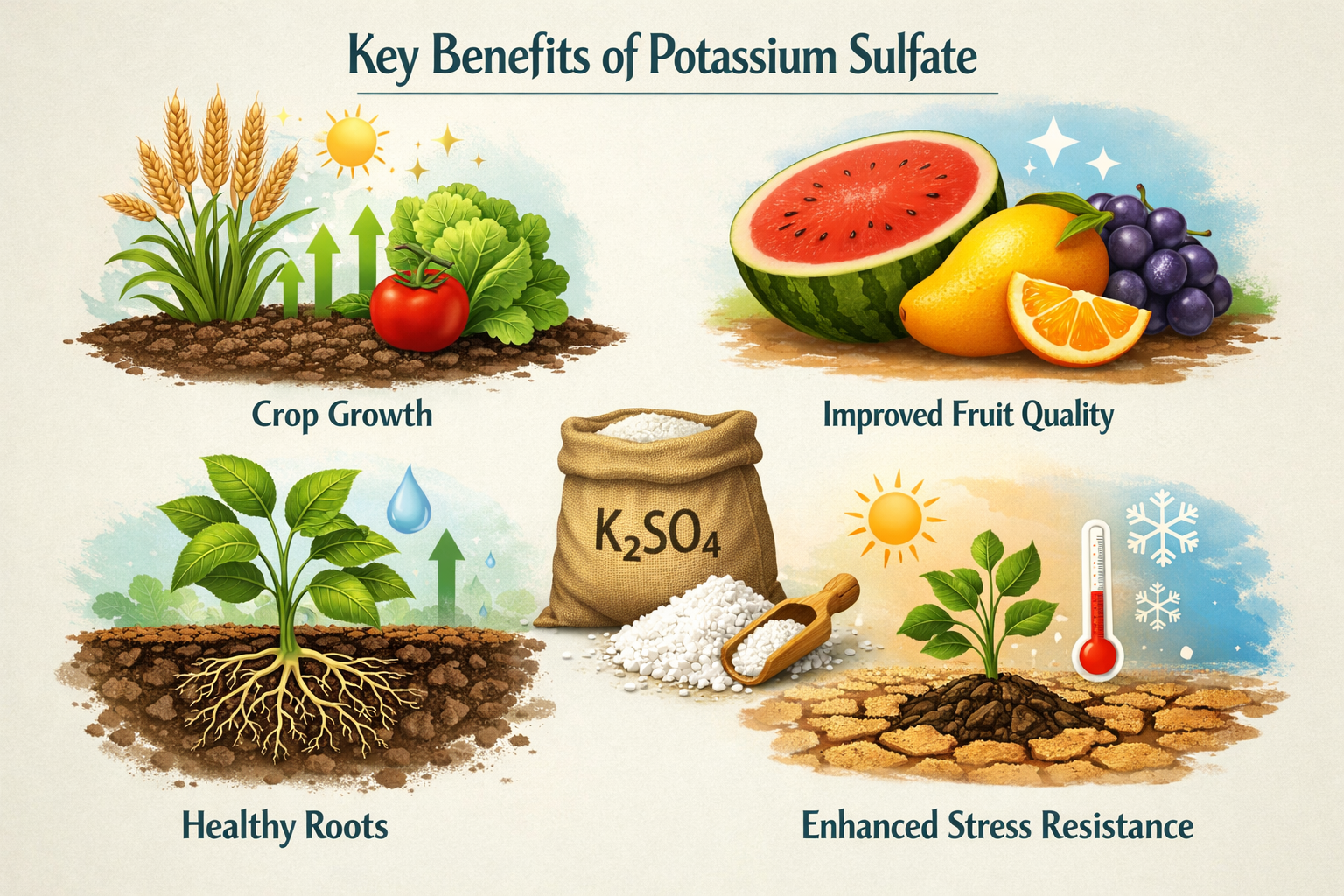Understanding Potassium Sulfate – Uses, Benefits, Applications (Part 1)
Introduction to Potassium Sulfate
Potassium sulfate (K₂SO₄), commonly known as sulfate of potash, is a white crystalline salt highly valued for its nutrient-rich composition and versatility. Its chemical structure combines potassium (K), an essential macronutrient for plant growth and sulfur (S), critical in enzyme activity and protein synthesis.
In agriculture, potassium sulfate is widely used as a premium fertilizer. Unlike other potash fertilizers, it contains no chloride, making it ideal for crops sensitive to salinity, such as fruits, vegetables and tobacco. It enhances plant resilience to drought and disease while improving the quality and yield of harvested produce. Additionally, the sulfur content aids in chlorophyll production and enhances nitrogen utilization.
Beyond agriculture, potassium sulfate finds applications in the industrial sector. It is used in specialty glass production, which acts as a flux to improve transparency and durability. In chemical manufacturing, it is a reagent or an intermediate for producing other potassium-based compounds.
Key benefits of potassium sulfate include its dual nutrient supply, compatibility with sensitive crops, and versatility across multiple industries. Its ability to promote sustainable agriculture and its industrial utility make it an indispensable sulfate compound in today’s economy.
Decachem plays a significant role in the global potassium sulfate market, specializing in the import and export of high-quality potassium sulfate for agricultural and industrial applications. As a trusted supplier,
Decachem ensures the availability of this essential fertilizer to meet the needs of farmers worldwide, particularly those cultivating chloride-sensitive crops. With a commitment to sustainability and product quality, Decachem facilitates efficient distribution channels, contributing to global food security and supporting environmentally conscious farming practices. Their expertise in the export/import of potassium sulfate helps ensure that vital nutrients reach markets where they are most needed.
What is Potassium Sulfate?
Potassium sulfate (K₂SO₄), or sulfate of potash, is a water-soluble fertilizer widely used for its dual nutrient content of potassium and sulfur. This white crystalline compound has excellent solubility, low hygroscopicity, free of chloride, making it ideal for chloride-sensitive crops such as grapes, citrus and potatoes.
Potassium sulfate is primarily produced through two methods: mining natural resources and chemical synthesis. Mineral extraction involves processing langbeinite, a naturally occurring mineral containing potassium sulfate and magnesium sulfate. Alternatively, chemical synthesis combines potassium chloride with sulfuric acid or other sulfur compounds to yield potassium sulfate and byproducts like hydrochloric acid.
Compared to potassium chloride (KCl), potassium sulfate is a superior alternative for crops sensitive to salinity or chloride accumulation. It provides added sulfur, which enhances protein synthesis and nutrient uptake, making it a preferred choice for high-value and specialty crops in modern agriculture.

Key Benefits of Potassium Sulfate
Boosting Crop Yields
Potassium is a vital macronutrient essential for optimal plant growth and development. It plays a key role in photosynthesis by regulating the opening and closing of stomata, ensuring efficient gas exchange and water use. Potassium enhances the transport of nutrients and sugars within the plant, contributing to energy production and metabolic processes.
Additionally, potassium strengthens root systems, promoting better water and nutrient uptake. It also boosts plant resilience against environmental stressors such as drought, disease and temperature extremes. Adequate potassium levels lead to improved crop yield, quality and overall plant health, making it indispensable in agriculture.
Chloride-Free Advantage
Potassium sulfate is the preferred fertilizer for chloride-sensitive crops like tobacco, citrus, grapes and avocados. Unlike potassium chloride, it contains no harmful chlorides that can stress these crops or reduce yield quality. The sulfur in potassium sulfate further supports essential processes like protein synthesis and chlorophyll production. Its compatibility with high-value, sensitive crops makes it a vital choice for productivity while maintaining soil enhancement and crop quality improvement.
Environmental Impact
Potassium sulfate minimizes the risk of soil salinity, as it is free of chloride, which can accumulate and harm plant growth. Its use supports sustainable farming practices, particularly in saline-prone areas. Additionally, eco-friendly production methods, such as mining natural minerals like langbeinite and low-impact chemical synthesis processes, make potassium sulfate an environmentally conscious choice. These attributes enhance its role in promoting healthy crops while preserving soil and ecosystem health.
Applications of Potassium Sulfate
Agricultural Applications
Potassium sulfate is a
commonly used specialty fertilizer known for its high potassium content and chloride-free composition, making it ideal for plant nutrition in sensitive crops. It is particularly effective in improving the yield and quality of fruits like grapes, apples and citrus, as well as vegetables such as potatoes and tomatoes.
The sulfur in potassium sulfate enhances protein synthesis and nutrient absorption, further benefiting plant health. Its water-solubility ensures efficient uptake, making it suitable for precision farming techniques. By providing essential potassium and sulfur, it supports robust root development, improved photosynthesis, and resistance to environmental stressors, helping farmers achieve optimal crop performance.
Industrial Uses
Potassium sulfate also has important industrial applications. It is a critical component in glass manufacturing, where it acts as a flux to enhance clarity and strength in specialty glass and ceramics.
In the pharmaceutical industry, potassium sulfate is used in specific formulations and as a raw material for producing other potassium-based compounds. Its versatile properties make it a valuable ingredient in various industrial processes, contributing to high-performance products while maintaining eco-friendly standards.
In the second part of this article, we'll talk about how to use potassium sulfate effectively and some of the potential challenges.













